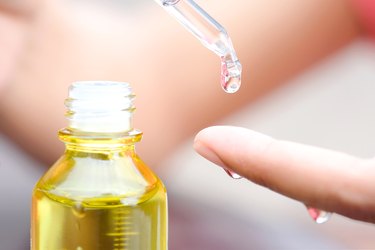
Scar formation accompanies surgical procedures. It is your body's way of healing your injured skin. Scars can be raised, sunken or flat and usually appear lighter or darker than your natural skin tone. You may view your scars as ugly and wish to fade or shrink such scarring. Since vitamin E is known to be an antioxidant with photoprotective properties, it has found its way into a multitude of cosmetic products that tout improved appearance of scar tissue. Even so, no proper scientific studies have been completed in support of vitamin E oil as a treatment for surgical scarring.
How Scars Form
Video of the Day
Your surgical incisions heal by collagen fiber formation but do not result in regular skin tissue. Also, the scar tissue is not as strong as your normal skin. Normal movements can pull and widen scar tissue during the healing process. Extra sutures buried within the dermal tissue can give additional strength to your external sutures as an incision heals. Maximum collagen production is accomplished in the first four to six weeks after surgery, but your scars can change appearance for about a year in adults and over several years for children.
Video of the Day
Vitamin E Has Antioxidant Properties
Vitamin E, or alpha-tocopherol, is a fat-soluble vitamin available in foods and as supplements. It has antioxidant properties and protects your cells against reactive oxygen and nitrogen, which disrupt normal cellular functions. It also supports immune health. Wounds heal from the inside out, so make sure your diet is rich in good food sources of vitamin E to ensure proper healing of your scar. Good food sources include: almonds, wheat germ, sunflower seeds and peanut butter.
Topical cosmetic products commonly contain vitamin E oils to promote its antioxidant properties. Research by K.C. Wan and J.H. Evans at the Hong Kong Polytechnic University, published in 1999 issue of Free Radical Biology & Medicine, found higher amounts of free radicals in hypertrophic scars, which become thicker, redder and more elevated than regular scars.
Read More: What Does Vitamin E Do for the Body?
Vitamin E Oil
Vegetable and nut oils are high in natural vitamin E content. The most common vitamin E oils come from soybeans, canola and sunflowers. Natural vitamin E oils are manufactured directly from plants by distillation, although yields are low and costs are high. Synthetic vitamin E, or dl-alpha-tocopherol, is a mixture of eight types of vitamin E. It is cheaper to manufacture, but its bio-availability is about half of natural vitamin E.
Read More: Vitamin E for Skin Discoloration
What Vitamin E Oil Research Says
Current research does not support vitamin E oil to reduce surgical scar formation. A study by T.L. Khoo at the Hospital Universiti Sains Malaysia, published in a 2011 issue of the Journal of Plastic, Reconstructive & Aesthetic Surgery, concluded that tocotrienols, a vitamin E subfamily, made no significant improvement in scar parameters. Also, a study conducted by Morganroth, Wilmot and Miller in Philadelphia for a 2009 issue of the Journal of the American Academy of Dermatology determined that scar products containing vitamin E oil did not support usage for the reduction of postoperative scar formation.
- National Institutes of Health; Vitamin E; December 2009
- Practical Plastic Surgery: Scar Formation
- NCBI: "Free Radical Biology Medicine" Free Radical Involvement in Hypertrophic Scar Formation; K.C. Wan, J.H. Evans; March 1999
- GPS Dairy Consulting: Archer Daniels Midland Company: Natural vs. Synthetic Vitamin E
- Science Direct: "Food Chemistry" High Pressure Extraction of Vitamin E-Rich Oil From Silybum Marianum; M. Hadolin, et al.; August 2001
- NCBI, Journal of Plastic, Reconstructive and Synthetic Surgery:A prospective, randomised, double-blinded trial to study the efficacy of topical tocotrienol in the prevention of hypertrophic scars
- JAAD: Over-the-counter scar products for postsurgical patients
- "Journal of the American Academy of Dermatology;" UV Photoprotection...; J.Y. Lin, et al.; June 2003
- The Vitamins & Nutrition Center; Antioxidant Properties of Vitamins; George Obikoya
- Canadian Family Physician; Vitamin E for Treating Children's Scars; D. Khoosal, R Goldman; July 2006
- "Journal of Plastic, Reconstructive & Aesthetic Surgery"; A Prospective...; T.L. Khoo, et al.; 2010
- "Journal of the American Academy of Dermatology"; Over-the-Counter...; P. Morganroth, et al.; 2009